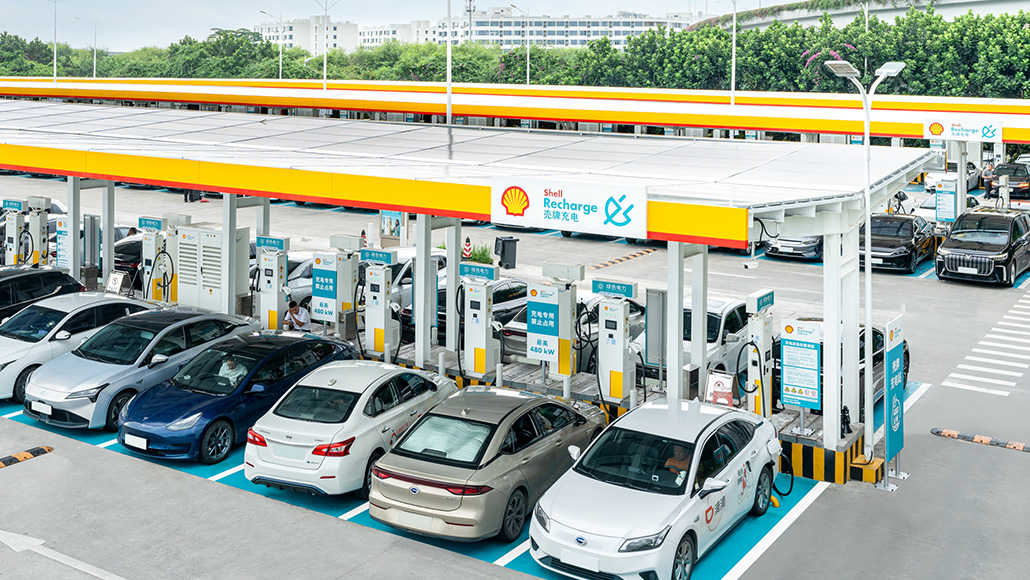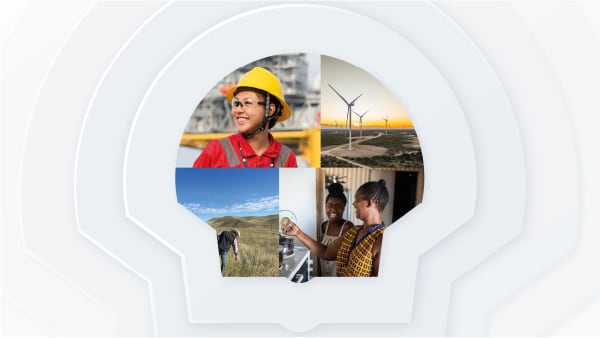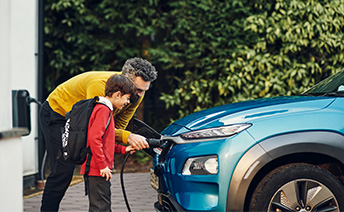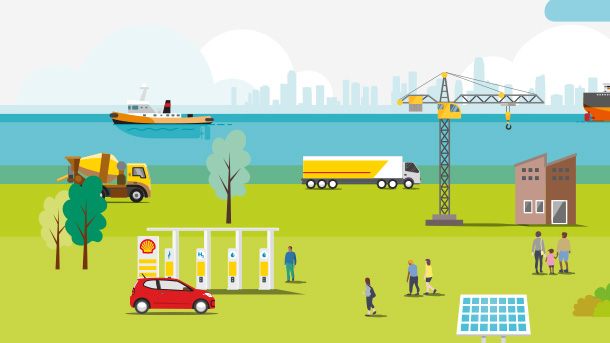Business and property
Mobility
Shell is one of the world's largest mobility retailers by number of sites, with more than 47,000 Shell-branded mobility locations in more than 80 markets at the end of 2023. We operate different models across these markets, from full ownership of sites to brand licensing agreements. As we aim to high-grade our network, we plan to divest around 500 Shell-owned sites (including joint ventures) each year until 2025.
Every day, around 33 million retail customers visit our mobility locations for a range of quality fuels, electric vehicle charging, and convenience and non-fuel products and services. Through Shell Fleet Solutions, our business customers can obtain fuel cards, road services and carbon-offset offers, among other products and services.
We are expanding our convenience and non-fuel retail offer to cater to our customers' needs. At many of our sites, we offer convenience items, including beverages and fresh food, and services such as lubricant changes and car washes. At the end of 2023, Shell operated 13,000 convenience stores worldwide. We have upgraded close to 2,000 stores with our Shell Café premium fresh coffee and food offer since launching in 2021.
Shell Mobility aims to take a leadership position in the energy transition by marketing more and cleaner fuels for our customers, focusing on growing our presence in key markets like China, Europe and the USA. To support this, we acquired Volta Inc. in 2023 and now own and operate one of the largest public electric vehicle charging networks in the USA. At the end of 2023, Shell had around 54,000 public charge points globally at Shell forecourts, on-street locations, mobility hubs and other sites, such as supermarkets.
Shell opened its largest electric vehicle charging station in the world in Shenzhen, China, with 258 public fast-charging points.

Our largest electric vehicle charging station opens in Shenzhen
We opened our largest electric vehicle (EV) charging station globally in Shenzhen, China, in September 2023. The Shell Recharge Shenzhen Airport EV Station is designed to serve thousands of drivers every day with 258 fast-charging points in one of the country's major economic and technology hubs.
China is one of the most important growth markets for Shell Mobility and will play a key role in Shell's electric vehicle charging strategy which is to continue building the infrastructure needed to meet our customers' future demand for charging. Globally, we are focusing on public charging and we expect to increase our charge points to around 200,000 by 2030.
The Shenzhen charging station – operated by Shell and BYD Electric Vehicle Investment Company Limited, a joint venture between Shell and Chinese electric vehicle manufacturer BYD – served more than 3,300 electric vehicles a day during its trial operation.
The rooftop solar panels installed at the Shenzhen station have the capacity to generate about 300,000 kilowatt-hours of renewable electricity per year, and this would be available to charge customers' vehicles. In addition to charging, the station also offers convenience retailing, food and beverages, and a drivers' lounge.
Through joint ventures and wholly owned enterprises, Shell in China operates a retailing network of around 2,000 fuel stations and an electric vehicle charging network of 25,000 public charge points. The utilisation rate of our electric vehicle chargers in all of China was around 25% in 2023, which is two-and-a-half times the industry average.
Shell offers products and services to meet the different energy and mobility needs of drivers. In September 2023, we opened the Panlong Integrated Energy Station in Wuhan. This station offers petrol and diesel, charging and hydrogen refuelling.
As we work to provide more low-carbon alternatives to our customers, we continue to develop traditional fuels for drivers of internal combustion engine vehicles. Aided by our partnership with Scuderia Ferrari, we have concentrated on developing fuels with special formulations designed to clean engines and improve performance. We sold fuels under the Shell V-Power brand in 68 markets in 2023.
Shell Commercial Road Transport (CRT) provides fuels, lubricants and digital services to customers with heavy-duty vehicles in their fleets. In 2023, Shell opened its first public electric vehicle charging facility for trucks in Hamburg, Germany. This consists of four fast-charging stations, and multiple eDepot solutions, which provide charging facilities at customer sites.
We also offer drivers using heavy-duty LNG-fuelled trucks access to operated and partner networks in Europe. In 2023 we opened our first LNG refuelling sites in Austria and Hungary.
In Germany, Shell is building a bioLNG liquefaction plant at Shell's Energy and Chemicals Park Rheinland. This liquefaction plant will supply the German market with bioLNG from 2024 and will help our CRT customers decarbonise their operations. Since 2022, Shell's customers in the Netherlands have been able to receive a bioLNG blend.
Lubricants
Shell Lubricants has been the number one global finished lubricants supplier in terms of market share for 17 consecutive years, according to Kline & Company data for 2022. Shell lubricants are available across more than 160 markets for passenger cars, motorcycles, trucks, coaches, and machinery used in manufacturing, mining, power generation, agriculture and construction.
We also make premium lubricants for conventional vehicles and Shell E-fluids for electric vehicles using gas-to-liquids (GTL) base oils that are made from natural gas at our Pearl GTL plant in Qatar.
See "Integrated Gas".
Our global lubricants supply chain has a network of 32 lubricants blending plants, four base oil plants (one of which we operate), 10 grease plants and six GTL base oil storage hubs.
During 2023, we completed the acquisition from M&I Materials Development Limited of the MIDEL premium product range of ester-based dielectric transformer fluids, which provide a differentiated position in Transformer Oils. These oils are used in power distribution, offshore wind parks, utility companies and traction power systems. We also acquired the MIVOLT brand of dielectric fluids for the direct immersion cooling of battery systems and power electronics. MIVOLT's ester-based immersion cooling fluids support the development of thermally efficient electric vehicle batteries, battery storage systems and data centres.
Sectors and Decarbonisation
Sectors and Decarbonisation sells fuels, speciality products and services, including low-carbon energy solutions, to a broad range of commercial customers, including in the aviation, marine and agricultural sectors.
Shell Aviation provides aviation fuel, lubricants and low-carbon solutions globally. In May 2023, Shell announced a multi-year offtake agreement for sustainable aviation fuel with Montana Renewables, one of the largest sustainable aviation fuel producers in North America. In 2022, Shell launched Avelia, one of the world's first blockchain-powered digital sustainable aviation fuel (SAF) book-and-claim solutions for business travel. Since then, customers – including Google, Bank of America and Yokogawa – have joined the platform. Avelia is designed to help trigger demand for SAF, encouraging investment in production, which could lower the price point for these fuels.
Shell Marine offers customers marine fuels and lubricants, as well as low-carbon solutions, and has a supply network that covers key bunkering locations around the world. Through our marine activities, we primarily provide the shipping and maritime sectors with lubricants, and we provide fuels, chemical products, and related technical and digital services. We supply more than 300 grades of lubricants and seven types of fuel to vessels worldwide, ranging from ocean-going tankers to fishing boats. Shell Marine lubricant products are used in around 10,000 vessels and are available in more than 700 ports across more than 60 countries.
Shell Bitumen supplies customers across 60 markets and provides enough bitumen to resurface 500 kilometres of road lanes every day. It also invests in research and development to create innovative products, such as bitumen that can help reduce the impact of asphalt production and paving on local air quality.
Shell Sulphur Solutions manages the value chain of sulphur from refining to marketing. It provides sulphur for use in applications, such as fertiliser, mining and chemicals. It also licenses Shell Thiogro technologies to create sulphur-enhanced fertilisers.
Shell and the non-operated joint venture Raízen (Shell interest 44%) are, together, one of the world's largest blenders and distributors of biofuels. In 2023, around 9.7 billion litres of biofuels (2022: 9.5 billion litres) went into Shell's sale of fuels worldwide, which includes the Shell share of sales made by Raízen. In addition, in 2023, Raízen produced, on a 100% basis, around 3.12 billion litres of ethanol (2022: 3 billion litres) and around 5.8 million tonnes of sugar from sugar cane (2022: 4.8 million tonnes). The cellulosic ethanol plant at Raízen's Costa Pinto mill in Brazil produced 30 million litres of second-generation ethanol in 2023 (2022: 26 million litres). The majority of the ethanol and cellulosic ethanol produced by Raízen is sold unblended to international customers in markets such as the USA, Europe and Japan.
RNG, also known as biogas or biomethane, is gas derived from processing organic waste in a controlled environment until it is fully interchangeable with conventional natural gas.
In February 2023, Shell completed the acquisition of Nature Energy, one of the largest producers of RNG in Europe. This acquisition supports our ambitions to build an integrated RNG value chain at global scale as we seek to profitably grow our low-carbon offerings across multiple sectors. Shell aims to generate additional value from our trading and supply chain. Together with its partners, Nature Energy owns and operates 13 biogas plants in Denmark and one in the Netherlands.
Shell is constructing two facilities which will convert dairy manure to RNG and which will be located at the Bettencourt Dairies in Wendell, Idaho, USA. Shell Downstream Bovarius is expected to produce around 400,000 MMBtu a year of negative-carbon-intensity RNG. The second facility, Shell Downstream Friesian, is expected to produce around 350,000 MMBtu a year of negative-carbon-intensity RNG using cow manure from the dairy once operational. Both facilities are expected to be operational in 2024.









